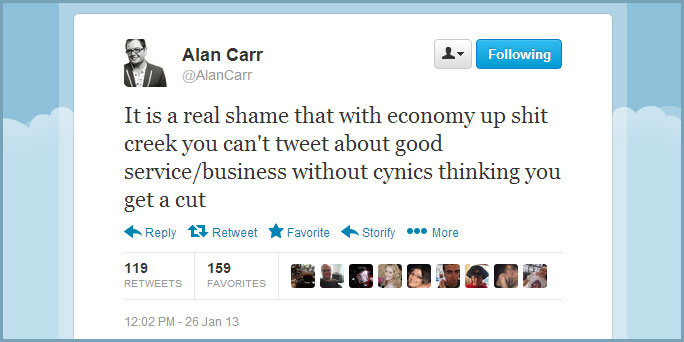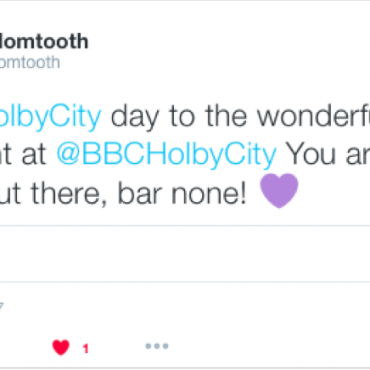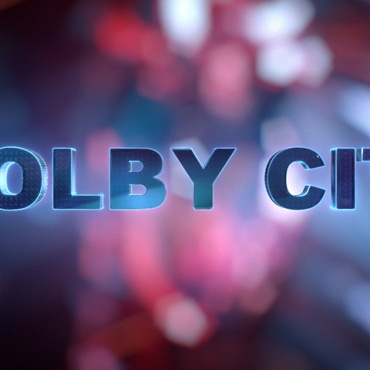 Channel 4’s Dispatches programme last night focused on social media, celebrity endorsement the problem of ‘click farms’, which promise to generate thousands of fake fans for a fee.
Channel 4’s Dispatches programme last night focused on social media, celebrity endorsement the problem of ‘click farms’, which promise to generate thousands of fake fans for a fee.
Dispatches’ Celebs, Brands and Fake Fans will inevitably lead to questions about the veracity of social media posts, of the integrity of celebrities and brands on Twitter, Facebook and YouTube, and of the value of social media data and insights.
The programme focuses on “click farms” – which, for a fee, are fraudulently used to boost follower and Like numbers on Twitter and Facebook and views on YouTube for example. It also looked into the thorny issue of paid celebrity endorsements for products and brands.
However, what was not made clear in the programme was how widespread this practice might be. They highlighted some questionable practices, but I’d argue that, sadly, there are cowboys in every industry, and people out there who fall for their spiel without getting proper advice.
The social media industry has grown up considerably over the past 3-4 years for two main reasons:
- Data and insights coming from genuine fans and customers through social media, the instant feedback on a programme or product, can be incredibly valuable. Add thousands of fake fans to your Facebook page or Twitter following and you render your data worthless.
- Paid for tweets can create an unwelcome backlash – many fans will object to being advertised to on social media platforms unless it’s done sensitively and openly.
The reaction on Twitter was interesting with many wondering what all the fuss was about – surely this happens in every industry? – and others were shocked at the revelations. My worry is that many will tar everyone working in social media with the same brush.
And to be honest, I was most sorry for the poor sods in Bangladesh earning a pittance by spending hours in windowless rooms creating fake likes and follows.
Here’s some best practice advice…
ADVERTISING AND SPONSORSHIP
There have been plenty of high profile cases of paid sponsorship deals that have fallen foul of advertising codes, but many cases seem to be down to ignorance rather than any deliberate attempt to mislead. It’s always best to be open and honest – if you’re getting paid to advertise something simply add the hashtag #ad or #spon to your tweet.
The Internet Advertising Bureau has some useful guidance on the use of social media and paid promotion their website. It should be mandatory reading for agencies, celebrities, brands… If you’re not sure about something, get advice before you post.
There’s a real grey area around freebies and tweeting about them, and I’m not sure that the Coronation Street actors or Russell Kane, both mentioned in the programme, broke any rules. They all denied being paid for tweets.
Conversely, we have found that the practice also leads to false accusations of advertising when celebrities talk about brands in passing.
It is a real shame that with economy up shit creek you can’t tweet about good service/business without cynics thinking you get a cut
— Alan Carr (@AlanCarr) January 26, 2013
Really weird, slightly depressing and tedious that I get so many tweets accusing me of being paid to tweet about something. I don’t.
— Jonathan Ross (@wossy) January 26, 2013
In short: be up front about what the deal is. People don’t mind advertising if they know what it is – and if it isn’t the sole purpose of an account!
A NUMBERS GAME?
When it comes to fake fans, we think that there is a huge problem with buying Facebook Likes, Twitter follows or YouTube views and subscribers. Whilst the numbers might look impressive, they have little worth bar fooling some into thinking that you’re a “big player”. There’s more to be said for slowly building a following of genuine fans.
Social media data can be valuable – you can get instant feedback from fans, viewers, listeners. You can see what kind of people are attracted to your programme or brand.
As David Ellis from analytics agency Station 10 told me, “There’s a risk of accepting data from social media sites at face value. The vital point is to establish links to actual sales or legitimate behaviour from social media, and fortunately most brands will have other data sources against which to validate social performance.”
When it comes to interrogating data, he offered the following pointers:
- Look out for increased volumes in social activity over short periods against a benchmark, particularly from otherwise obscure international markets.
- Create a segment or view to focus on traffic that comes from your core or home markets.
- Match these patterns against web site traffic, to see if this correlates.
THE LONG GAME
There are no real quick wins when it comes to social media. We advise our clients to see the long game . Engagement is all important, and you can’t have any kind of meaningful relationship with a fake “fan”.




